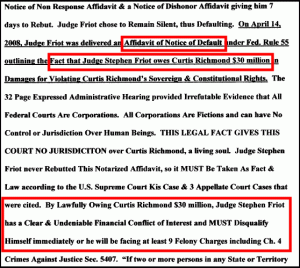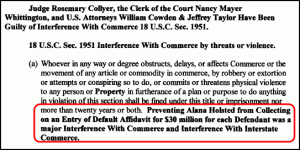BREAKING NEWS: Richmond’s Utah ‘Indian’ Appeal Dismissed; Victims Say He Sought $30 Million Judgment Against Federal Judge Hearing The Case On Eve Of Trial
UPDATED 1:21 A.M. EST (FEB. 7, U.S.A.) The U.S. Court of Appeals for the 10th Circuit (Denver) has dismissed Curtis Richmond’s appeal in the sham Utah “Indian Tribe” case, saying Richmond “failed to comply with the court’s order of December 17, 2008 directing [him] to pay the appellate filing fee in full by January 7, 2009.”
Documents filed as part of the appeal raise new questions about some of the claims Richmond made in filings earlier this week in the ASD case.
Richmond, who said in filings in the ASD case that the government’s actions in seizing money from ASD cost his organization tens of thousands of dollars, claimed in his “Indian” appeal that he was a pauper. The motion by Richmond to file in forma pauperis in the “Indian” appeal was filed June 4, 2008.
But on Aug. 1, 2008, according to Richmond’s filings in the ASD case, Pacific Ministry of Giving International, of which Richmond is chairman, had $41,000 at stake in AdSurfDaily, “counting the Upgrade Bonuses promised between July 14th and Aug. 1, 2008.”
Meanwhile, victims in the Utah “Indian” cases — including a county prosecutor who was subjected to a $250 million fraudulent judgment handed down by a bogus tribal arbitration panel upon which Richmond served — said Richmond attempted to derail the case on the eve of trial by preparing a fraudulent judgment for $30 million against the presiding federal judge.
U.S. District Judge Stephen Friot did not recuse himself from the case despite Richmond’s last-minute maneuver and ordered Richmond and co-defendants to pay more than $108,000 in damages and costs to the injured parties for engaging in racketeering and mail fraud.
“[Sham ‘Indian Chief’ Dale] Stevens contends that the Honorable Stephen P. Friot was biased and should have disqualified himself,” the victims said in an appeal brief. “Stevens makes this claim based upon a $30 million judgment co-conspirator Richmond supposedly obtained against Judge Friot shortly before the trial commenced.”
In filings in the ASD case, Richmond referenced $30 million as the amount an ASD member sought to collect from each of four public officials involved in the case. He is being hailed a “hero” on the Surf’s Up Pro-ASD forum and on a forum for AdViewGlobal set up by some of the Surf’s Up Mods.
Injured parties in the Utah cases, however, see things differently.
“Rather than respond to Uintah County Appellee’s Counterclaim, Richmond moved to dismiss for lack of jurisdiction,” the injured parties said. “That Motion was denied. Uintah County Appellee’s requested an entry of default against Richmond for failure to respond to the Counterclaim.
“In denying Uintah County Appellee’s Motion, the Court ordered Richmond to file a responsive pleading,” the injured parties said. “Rather than answer Uintah County Appellee’s Counterclaim, Richmond moved to disqualify Judge Friot based upon a fraudulent $30 million award he had allegedly obtained against Judge Friot in much the same manner as the arbitration awards entered by the Wampanoagers [sham tribe] by Uintah County Appellees. Judge Friot denied the Motion to Disqualify and entered a Default Judgment against Richmond for failure to appear at trial.”
30 Million Things In Common
An ASD member named Alana Holsted was stymied in efforts to collect on an “Entry of Default Affidavit for $30 million for each Defendant,†Richmond said in filings in the ASD case.
And $30 million was a notable figure in the “Indian” case as well, which included a flurry of certified mail. A certified-mail campaign also is part of the ASD case.
Injured parties in the “Indian” case said Richmond deliberately tried to scuttle the proceedings.
“Shortly before the trial commenced, Richmond embarked on the same course of conduct to obtain a fraudulent judgment/award against the Honorable Stephen P. Friot,” the injured parties said in an appeal brief.
“First, Richmond sent a notice or demand for administrative proceedings to the Court,” they continued. “That notice was followed up by Notices of Dishonor and Nonresponse from Richmond. On April 14, 2008, Richmond filed an Affidavit of Notice of Default. Finally, he filed his Motion to Disqualify based upon a $30 million administrative judgment obtained against Judge Friot.”
Friot, however, refused to step down.
“The administrative proceeding conducted by Richmond against Judge Friot was as much of a sham as the fraudulent arbitration awards,” the injured parties said. “Therefore, not only was there no need for Judge Friot to recuse himself, but had he done so would have been an abuse of discretion because it would encourage other obstreperous litigants to entertain such actions on eve of trial leading to needless delays and added expense in bringing such cases on for trial.”
Appeal ‘Not Taken In Good Faith’
A three-judge panel in the U.S. Court of Appeals said Richmond was filing nonsense during the appeals process as well. His motion to file as a pauper was denied, and he was ordered to pay for a transcript of the Utah trial and to pay the full cost of filing the appeal.
“[T]he appeal was not taken in ‘good faith’ because Richmond failed to ‘show the existence of a reasoned, nonfrivolous argument on the law and facts in support of the issues raised on appeal,” the panel said.
“Richmond’s brief complains primarily about the lack of evidence to support the district court’s judgment,” the panel said.
Here is how Richmond put it:
“The Case was about Arbitration Awards that the Biased Judges ruled were obtained from a Sham Arbitration Council without Any Legal Evidence of the Arbitration being a Sham Arbitration Council. Only the Opinion of an Atty. & Judge were presented.â€
And here is how the court responded:
“What little law he cites is either wrong or taken out of context. The brief is hyperbole.”
Richmond fundamentally is making the same argument in the ASD case — an argument that the prosecutors don’t have “Legal Evidence” and that the judge is in cahoots.
Dale Stevens, chief of the sham tribe, fared no better with the three-judge panel.
“The closest thing to an argument in his two-page invective is the statement that ‘[t]he trial was nothing more [t]h[a]n a Kangaroo Court as Curtis Richmond got a judgment [a]gainst the judge and ask[ed] him to s[te]p a side and he refused, so the ruling must be rever[sed] and the Contracts honored as they are the highest kind of contracts.’ This falls far short of a reasoned, nonfrivolous legal argument,” the panel said.
Like Stevens in his appeals motion, Richmond in his ASD motion made a “Kangaroo Court” claim, saying Judge Rosemary Collyer was running one, as was Chief Judge Royce Lamberth.
Richmond’s motion also included accusations that Collyer was a felon, along with assertions he had the same type of “contract” in the ASD case as Stevens had in the “Indian” case.


[…] appealed the decision in the Utah case, claiming poverty. Months later he filed court documents in the ASD case that declared Pacific […]